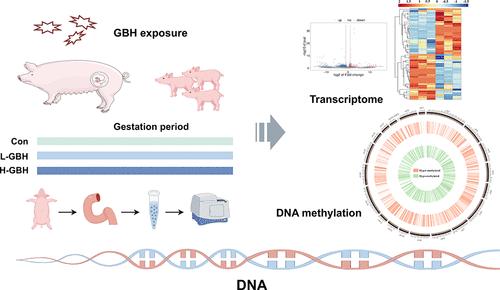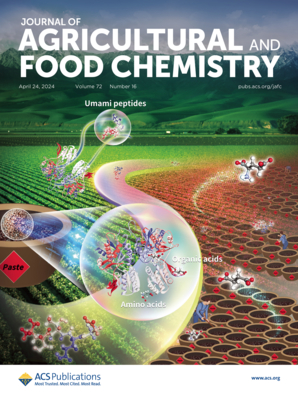Glyphosate-Based Herbicide Stress During Pregnancy Impairs Intestinal Development in Newborn Piglets by Modifying DNA Methylation
IF 6.2
1区 农林科学
Q1 AGRICULTURE, MULTIDISCIPLINARY
引用次数: 0
Abstract
Glyphosate-based herbicide (GBH), a feed contaminant, has been proven to impair the growth and development of humans and animals. Previous research has revealed that maternal toxin exposure during pregnancy could cause permanent fetal changes by epigenetic modulation. However, there was insufficient evidence of the involvement of DNA methylation in maternal GBH exposure-induced intestinal health of offspring. Here, we established pregnant sow exposure models to investigate the effects of GBH on the intestinal DNA methylation of newborn piglets. The results showed gestational exposure to GBH compromises the intestinal function of newborn piglets as well as decreases the mRNA expression of Dnmt1 and Dnmt3b jejunum. Further RRBS DNA methylation analysis revealed genomic hypomethylation in jejunum, and the differentially methylated regions were enriched in the pathways of intestinal development and food digestion and the related GO terms. Additionally, integrative analysis of methylome and transcriptome identified 23 genes showing inverse correlations and indicated the underlying injury mechanisms upon maternal GBH. These findings provide new insights and fundamental knowledge into the possible involvement of DNA methylation in the intestinal injury of offspring induced by maternal GBH exposure during pregnancy, which drives manufacturers to develop low-toxicity herbicide to ensure food safety and human health.

妊娠期草甘膦除草剂应激通过改变DNA甲基化影响新生仔猪肠道发育
草甘膦除草剂(GBH)是一种饲料污染物,已被证明会损害人类和动物的生长发育。先前的研究表明,怀孕期间母体毒素暴露可能通过表观遗传调节导致胎儿永久性改变。然而,没有足够的证据表明DNA甲基化参与母体GBH暴露诱导的后代肠道健康。为此,我们建立了妊娠母猪暴露模型,研究GBH对新生仔猪肠道DNA甲基化的影响。结果表明,妊娠期暴露于GBH会损害新生仔猪的肠道功能,并降低空肠Dnmt1和Dnmt3b mRNA的表达。进一步的RRBS DNA甲基化分析显示,在空肠中存在基因组低甲基化,并且差异甲基化区域在肠道发育和食物消化途径以及相关的氧化石墨烯方面富集。此外,甲基组和转录组的综合分析鉴定出23个基因呈负相关,并指出了母体GBH的潜在损伤机制。这些发现为DNA甲基化可能参与孕妇妊娠期间暴露于GBH引起的后代肠道损伤提供了新的见解和基础知识,这促使制造商开发低毒除草剂,以确保食品安全和人类健康。
本文章由计算机程序翻译,如有差异,请以英文原文为准。
求助全文
约1分钟内获得全文
求助全文
来源期刊
CiteScore
9.90
自引率
8.20%
发文量
1375
审稿时长
2.3 months
期刊介绍:
The Journal of Agricultural and Food Chemistry publishes high-quality, cutting edge original research representing complete studies and research advances dealing with the chemistry and biochemistry of agriculture and food. The Journal also encourages papers with chemistry and/or biochemistry as a major component combined with biological/sensory/nutritional/toxicological evaluation related to agriculture and/or food.

 求助内容:
求助内容: 应助结果提醒方式:
应助结果提醒方式:


